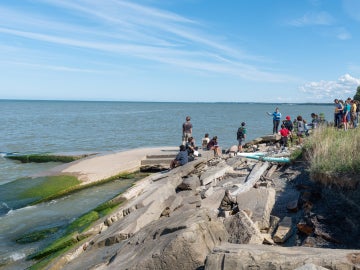Microscopic Worm Leads to Big Opportunity
August 11, 2015
Kasey Cheydleur

Photo credit: Tanya Rosen-Jones
This summer, Gabriel Moore ’15 flew to Los Angeles to present on one of his favorite topics—worms.
Moore, a biology and musical studies major with a minor in chemistry, was awarded a travel grant to attend the 2015 C.elegans International Meeting, organized by the Genetics Society of America. While at the conference, he had the chance to present the research he conducted in Associate Professor of Biology Maureen Peters’s lab on Caenorhabditis elegans, or C.elegans—microscopic worms that can serve as model organisms to study biological processes that may then be applied to more complex organisms.
At the conference he also attended a keynote talk by Nobel Laureate Craig Mello, who codiscovered RNA interference, a gene silencing mechanism, using C.elegans. Part of his speech that particularly resonated with Moore was his emphasis on the need to test broadly accepted scientific principles—that no experiment is simple enough to assume the outcome—after all, such an experiment was the foundation for his Nobel Prize. In the fall, Moore plans to attend Princeton University to pursue a PhD in molecular biology.
As Moore’s research mentor, Peters sees significant benefits for students attending these conferences because they can “observe the inner workings of the science community from both an intellectual and a cultural perspective. Undergraduate scientists who attend these meetings gain skills that are critical to their development as research scientists and achieve a greater understanding of how the science community works firsthand. Most importantly, they learn that it is fun and rewarding to share your work and excitement with people with similar interests.”
Moore began working in Peters’s lab during his sophomore year as a part of the Oberlin College Research Fellowship Program and continued his research over multiple summers and winter terms. He describes the 2015 C.elegans conference as a meeting of peers sharing a common interest.
“A lot more people knew about the research I was doing,” Moore says. “Which was interesting because at most other conferences—or even presentations I give—I have to give the basic ‘what is a C.elegans worm.’ But here that was taken for granted and everyone knew what the worm is, so you can talk about the details of your research more intimately with people. And I could ask more detailed questions of the people at the sessions.”
A native of Gaston, South Carolina, Moore has also worked extensively outside the lab as a Bonner Scholar. He played trombone in the Arts & Sciences Orchestra and helped relaunch the Black Scientists Guild at Oberlin. He also volunteered with the Multicultural Resource Center, served on Interfaith Student Council, and was a member of Oberlin Christian Fellowship.
Moore credits Oberlin with opening his eyes to the broader implications science can have on such issues as race, culture, gender, and sexuality, and that science is not exempt from discussions about these issues. This realization led to him wanting to revitalize the previously defunct Black Scientists Guild. “If I had gotten a BS in biology from a state school, all I would think about is science, but because of the liberal arts approach, you have to think about all of the impacts that could be brought up and be able to criticize things well,” Moore says.
Peters says his various passions and interests—science, music, community leadership, and service—are not easily compatible, but he has managed to excel in all his pursuits. “His seemingly limitless energy and enthusiasm has been inspiring. He constantly challenges himself to give more of himself, not only to his research, but to others who need a hand in any area of life. One of the best parts of being an undergraduate research mentor is the meaningful relationships I form with my research students. I look forward to hearing all about Gabe's adventures this coming year at Princeton, as well as his continued contributions to biological research.”
After earning his PhD, Moore says he would like to continue to pursue research, as well as actively encourage the recruitment of underrepresented students in the sciences, either as a professor, teacher at a science magnet school, or through nonprofit work.
You may also like…
Oberlin Named a Top Producer of Fulbright Students for 2025-26
Oberlin College and Conservatory was named a Top Producer of Fulbright students for the 2025-2026 academic year.
Research Roundup
Every day, Oberlin’s faculty and students produce scholarly work that uncovers new insights into how we understand the world, particularly in the areas of sustainability and the environment.
Leo Hidy ’23 Earns 2026 Marshall Scholarship
Leo Hidy ’23, a comparative American studies major who also studied business and economics while at Oberlin, has received a 2026 Marshall Scholarship that will fund two years of graduate study in the UK.


